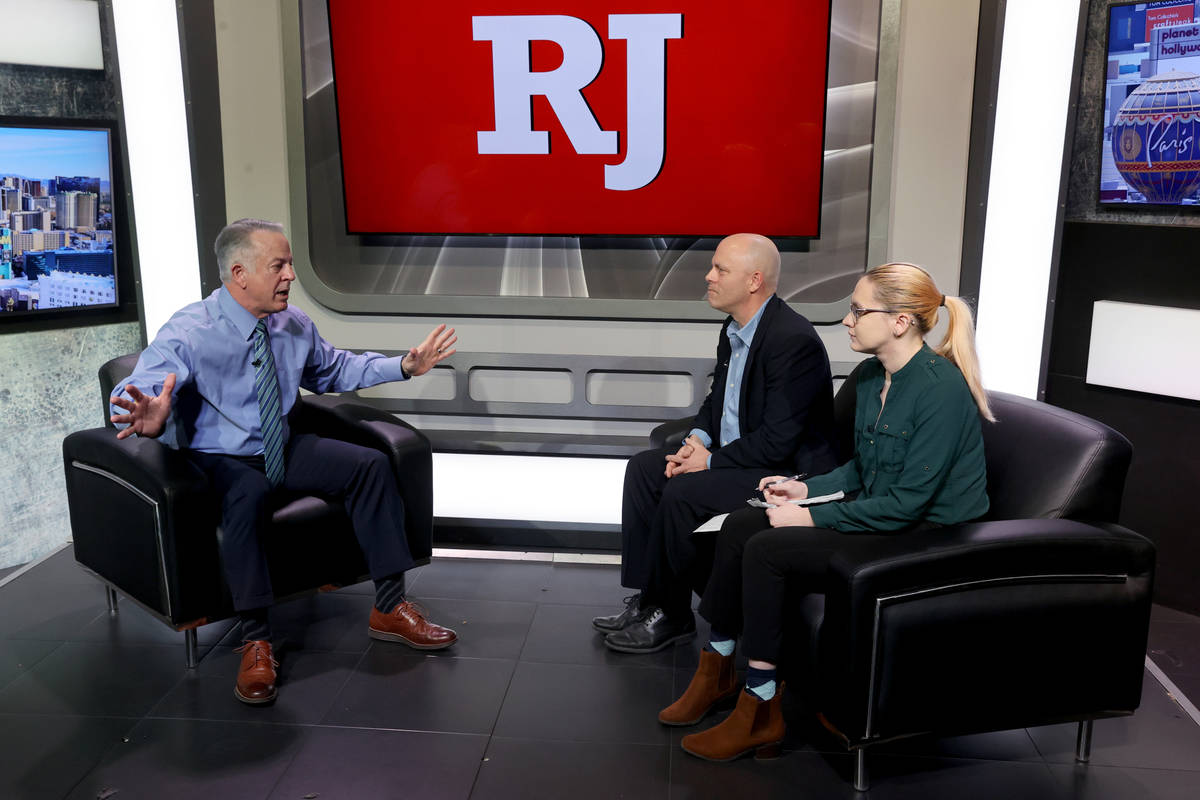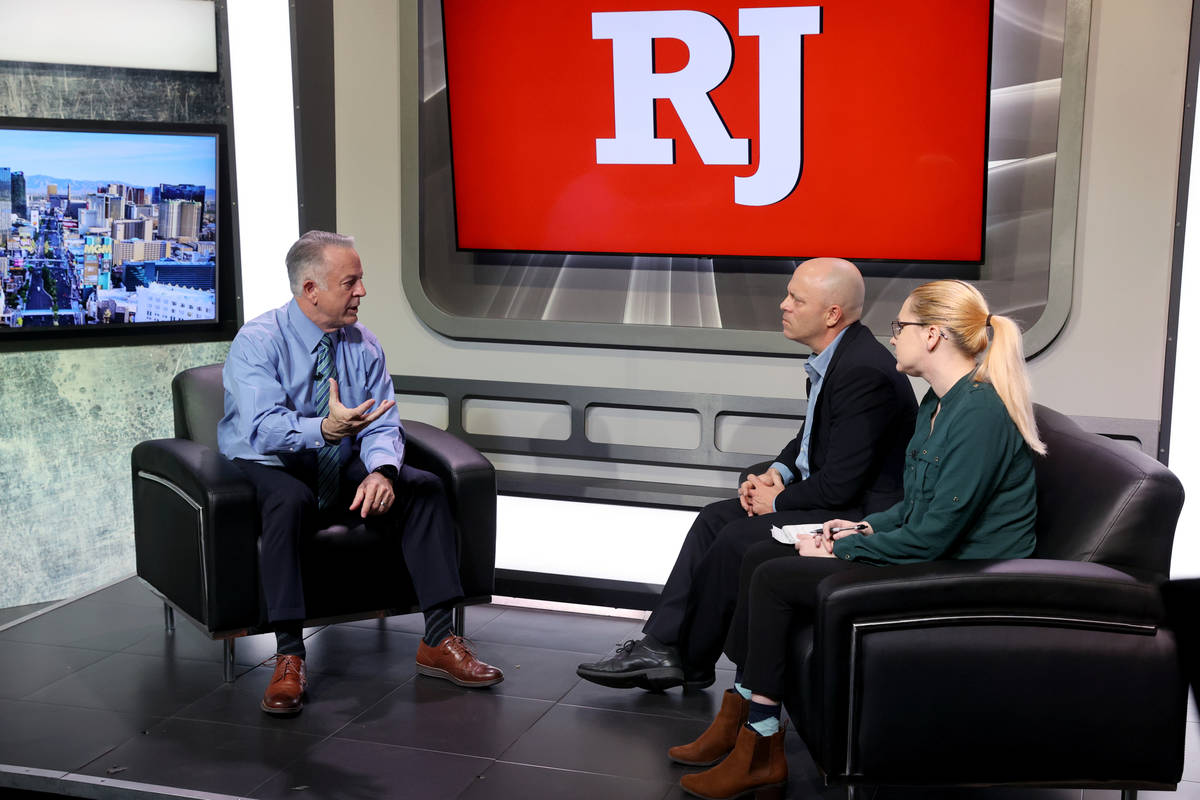Lombardo says George Floyd death ‘effected change’ within Metro, across the nation
Clark County Sheriff Joe Lombardo talked policing reforms, crime statistics and the need for increased mental health services in Southern Nevada during an interview with the Las Vegas Review-Journal this week.
Lombardo said he views the May death of George Floyd in Minneapolis as a “watershed moment” for policing in America. This week, jury selection continued in the murder trial of former Minneapolis police officer Derek Chauvin, who is charged with murder after lethally pressing his knee against Floyd’s neck for nearly nine minutes.
“Nobody is trained to do that,” Lombardo said of the tactics used against Floyd. “I don’t care what police department you are, whether you are a robust police department like us, or a small local community police department. Nobody is trained to conduct themselves that way. It was very troublesome for me as a police administrator and as a former street cop to see that done.”
Lombardo said Floyd’s death has “effected change” across the nation and within the Metropolitan Police Department that he oversees.
Following a 2012 investigation by the U.S. Department of Justice prompted by a Review-Journal series on fatal police shootings and deaths in police custody, Metro reformed its policies.
But Metro has still drawn criticism in recent years after several high-profile killings, including the death of Tashii Brown. In 2017, an officer used a stun gun on Brown seven times, punched him at least a dozen times, and put him in an unauthorized, martial-arts-type chokehold for more than a minute.
Lombardo on Thursday said that following Floyd’s death, the department removed a type of restraint called a lateral vascular neck restraint from its tactics. An officer using the restraint applies pressure to the side of someone’s neck.
He said Metro was already training officers for years on de-escalation tactics with the goal of reducing deadly encounters with police.
“We saw that people don’t differentiate between the (lateral vascular neck restraint) and the chokehold,” Lombardo said. “To the normal layman, or the public perception, it is, ‘It is a chokehold, sheriff. Do something about it.’ So we removed that from our force continuum.”
Nevada subsequently banned the use of all police chokeholds in August.
Response to protests
Lombardo said he feels Metro did a great job overall in responding to mass protests throughout the Las Vegas Valley in the aftermath of Floyd’s death, even though attorneys and activists questioned some of the department’s tactics during the summer.
During numerous protests, police arrested dozens of people, including protesters, two journalists and legal observers.
Lombardo said Metro has never dealt with large crowds “on a daily basis, weekly basis, monthly basis at the numbers that we experienced” during the protests. Looking back, he said, there is room for improvement, including how police identify the people who actually break the law at protests and “making that criminal case comprehensive when it is presented to the (district attorney.)”
“So there were a lot of things … that needed to be identified as failures — not necessarily failures, but deficiencies in what we do as a police agency,” Lombardo said. “I’m fully aware that we had some warts, for a lack of a better description, in our response. I also think we did a great job under the constant barrage of what we had to deal with.”
Crime statistics, trends
Lombardo said Metro has been effective in reducing crime in the valley. He said overall crime in Metro’s jurisdiction decreased by 13 percent from 2019 to 2020.
“If you look at major city (police departments) across the board, 55 or 56 of them, only eight agencies had a decrease in crime across the board … We were one of them,” Lombardo said.
He said police continue to address violent crime on Strip. Last year, a string of high-profile shootings on the tourist corridor generated headlines and attention on social media. In response, police increased their presence and focused on deterring aggravated assaults, arresting more than 1,200 people on the Strip during a three-month operation to curb violence.
That type of “omnipresence,” the sheriff said, has reduced crime on the Strip, but there is still work to do.
“This year we’ve had an increase of 4 percent year to date,” Lombardo said, referencing the volume of aggravated assaults on the Strip and surrounding area. “If you look at last year’s numbers, it was more in the 14 percent to 17 percent (range) depending on what time of year you are looking at. What we’ve been done is beneficial, but all of violent crime and property crime has decreased in the Strip environment.”
Lombardo said police have noticed an increase in murders and vehicle thefts in the valley in 2021.
“We’ve had the difference of 18 versus eight (last year), year to date, in murders,” Lombardo said. “And we’ve had a 20 percent increase in stolen vehicles.”
Lombardo said he believes those increases are a result of anxiety, frustration and economic hardship during the pandemic.
Mental health services
Lombardo said he supports the idea of mental health professionals assisting police when officers encounter the mentally ill, but the proposal is far from simple. The idea of mental health assistance for people police encounter has been a centerpiece of calls for police reform in Minneapolis.
“The argument is when the police show up, they escalate the situation, where if you had a mental health professional show up or counselor, they can talk them down from a situation,” Lombardo said. “Well, but you have to have a police officer to protect this person because you don’t know how a (mentally ill) person is going to react.”
Lombardo said policing has increasingly become a social work-type profession and that there is a need for more mental health services in the valley.
“What do you do with the person when they are taken into custody once we have de-escalated or calmed them down and made the situation static?” the sheriff said. “Where do you take them? What do you do with them?
“The answer has been you take them to jail, correct? The largest mental health facility in the county, the Clark County Detention Center, or the state. That’s not the answer. It costs way too much money, and it is the proverbial rotating door and the dog chasing his tail.”
Contact Glenn Puit by email at gpuit@reviewjournal.com. Follow @GlennatRJ on Twitter. Contact Katelyn Newberg at knewberg@reviewjournal.com or 702-383-0240. Follow @k_newberg on Twitter.





















